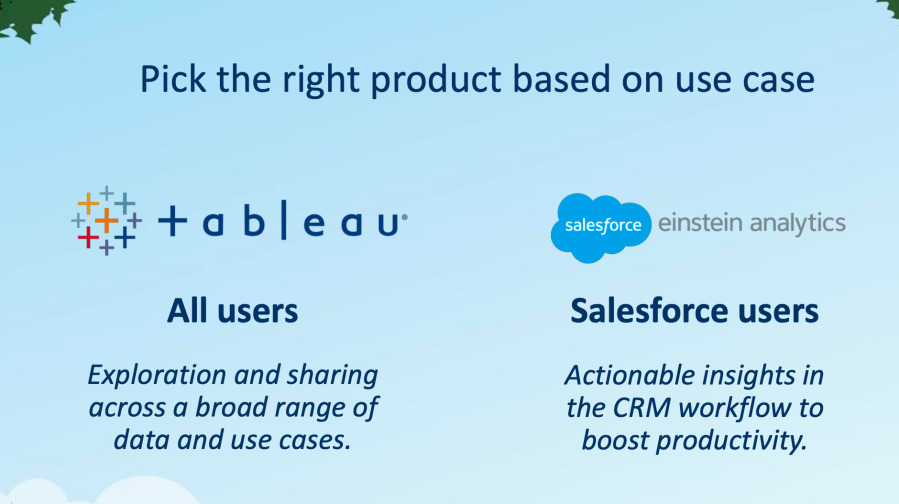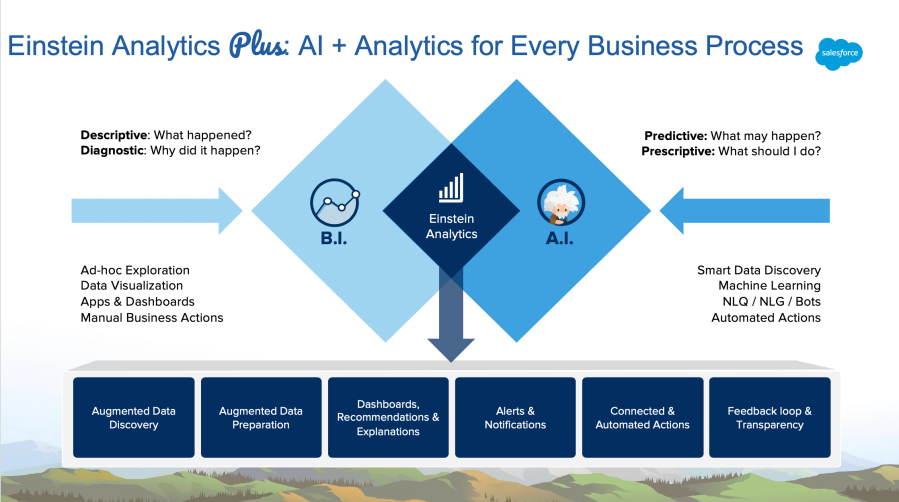It’s all about getting value from data – right? Sounds simple, but one of the many challenges faced in this quest is the plethora of Business Intelligence (BI) tools available for the user to choose from.
For example, consider the Gartner 2020 Analytics & BI Platforms Magic Quadrant:

Now that Tableau is a Salesforce product, Salesforce customers have two great integrated platforms to choose from when it comes to advanced data analytics:
- Einstein Analytics
- Tableau
The question of when to use Salesforce reports and dashboards or a dedicated BI platform is addressed in my popular article, “Why do you need Einstein Analytics when you already have Salesforce reports and dashboards?”
So:
Tableau or Einstein Analytics – which is best for you?
Please note that this post is written for the business user and data analyst, as opposed to highly technical content for the system architect or data scientist.
Let me address four considerations for choosing Einstein Analytics or Tableau:
1. Business use case
Ask yourself:
- Who is going to use the business insights?
- Where are they going to view and action the insights?
- How will they share those insights with others?

If most of your users are already in Salesforce, then Einstein Analytics is most likely your platform of choice. If you want to quickly embed analytics and action analytics in Salesforce, ditto.
If your insights are going to be widely shared among Salesforce and non-Salesforce users, or if you aren’t using Salesforce, then go with Tableau.
What about artificial intelligence?
As of today, June 20, 2020, if you’re looking for embedded AI, supervised machine learning, and other use cases of artificial intelligence, you’re going to need Einstein.

However, as the amazing Einstein engineering team continues to develop the Einstein Discovery machine learning platform, further integration with Tableau analytics is not too far away…
2. Existing systems
From a systems perspective, here is a simple summary of the landscape:
Einstein Analytics is purely cloud-based; it does not offer an on-premise option. It does not offer remote, federated queries (a federated query allows you to incorporate live data as part of your business intelligence and reporting applications).
Tableau does not provide the tight, native two-way integration with Salesforce that allows embedded dashboards, single and bulk actions in Salesforce, etc. It does offer more flexibility around how it fits in with the business technology stack:
Many system landscapes are a fit for both platforms, so this is not always a significant factor in choosing one over the other.
3. License structure
One area of distinction between Tableau and Einstein is the licensing structure.
You have, essentially, two options when it comes to Einstein Analytics: with or without Discovery AI. The Einstein Analytics Growth license gives any user create, view, and action capability; the Einstein Analytics Plus license adds machine learning:
I have not included the Einstein for Communities license that exposes Einstein Analytics via Community Cloud, nor have I even attempted to plumb the depths of the bottomless pit that is Einstein platform licenses (Sales Cloud Einstein, Einstein voice, NLP, etc.). Check below for an interesting summary matrix.
Tableau is entirely different, as seen below:

If you want to pay less for people who only view or explore your insights, and you want clear lines of demarcation between builders and viewers, then you might need Tableau.
4. Technical resources
It is worth mentioning that the availability of technical resources is much less for Einstein Analytics than it is for Tableau. The scarcity of competent and expert resources for Einstein Analytics has been a challenge in the ecosystem for some time. This is true for both in-house resources and consultants.
Conclusion
Hopefully this simple post has helped answer your question, “Do I need Tableau, or do I need Einstein Analytics?” If not, feel free to reach out to me (see below).
it is important to remember that, at the end of the day, it isn’t about the technology – it is about a business result. You must be able to go from data to insight to action, and the limiting factors in this process are much broader than simply technology. This is a complex subject upon which many smart people have written a great man words, so I’ll leave this for another time…
Need help with Tableau or Einstein Analytics? Get in touch with me here.
Appendix: Einstein for Sales
Datasheet here





Why do you say that Marketing Intelligence is not in Tableau CRM? don’t you consider Marketing Analytics intelligence? if not whats the different between intelligence and analytics in this case?
LikeLike
That is a Salesforce slide, Francis; not authored by me. We have built plenty of marketing analytics in TCRM; the only OOTB apps are Campaign Analytics and B2B Marketing Analytics.
LikeLike